The Provost Awards for Excellence in Community-Engaged Scholarship (PAECES) celebrate every year the significant efforts of faculty, staff, students, teams, and community partners who work to address critical community issues through collaborative, mutually beneficial, and creative exchange of knowledge and resources.
This year, two new award categories were added, including the Faculty Award for Community Impact, recognizing engaged scholarship work beyond research and teaching, and the Institutional Transformation Award, which honors those who transform UConn’s ability to align instruction, research, practice, and values in service of the common good.
Please join us in congratulating the following 2024 PAECES winners:
Faculty Category
Stephany Santos
Emerging Faculty Instructor Award
Associate Director of the Vergnano Institute for Inclusion and an assistant professor-in-residence in Biomedical Engineering, Santos is known for her devotion to equity in access and experience within the STEM field stemming back from her work as a UConn undergraduate.
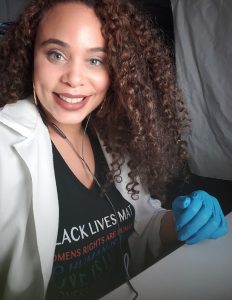
Since 2012, Santos has been an instructor for the Institute’s BRIDGE program, a five-week summer immersive for incoming UConn Engineering students from underrepresented groups to bridge the gap between high school and college. She recently co-developed and co-instructed a new course supporting underrepresented STEM women. Known as the BOSS LADI course, it is designed to build students’ confidence, communication, and leadership skills, particularly for Black and Latinx women in STEM, so that they have the agency to step into leadership roles and know their ability to affect change.
Her other innovative courses and programs include Exploring Mechanics: The Multiscale Mechanics of ME!, a camp and workshop for middle school girls, and the School of Engineering’s annual Explore Engineering event for high school students. She has taught multiple instances of the Engineering for Impact (ENGR 3025), a leadership development course for present and future leaders of engineering student organizations, including the National Society for Black Engineers, the Society of Professional Hispanic Engineers, and the Society for Women Engineers.
Santos has also focused on improving how faculty and staff in STEM fields support students from underrepresented groups, where she has been essential in developing critical DEI workshops and training opportunities. One example is the Inclusive Justice, Equity, Transformation (or JET) program initiated in the Fall of 2020, which has participants meet regularly to review DEI best practices, learn from current DEI literature, and work on action-oriented projects that each can bring back to their departments or classrooms.
Previously awarded the Inspiring STEM Equitability Award by the Connecticut Technology Council, Santos was named one of only five UConn Office of Diversity and Inclusion Faculty Affiliates in 2021.
Professor Dan Burkey
Distinguished Faculty Instructor Award
Associate Dean for Undergraduate Education and Diversity for the School of Engineering and professor-in-residence in the Chemical & Biomolecular Engineering Department, Burkey is revered as a creative, out-of-the-box thinker and educator dedicated to introducing UConn students to real-world issues and challenges.
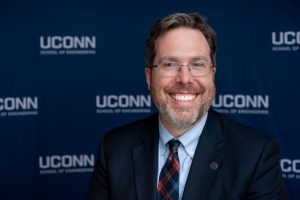
One example of his work includes the UConn service-learning program with the WeHa Unified Business Club, an organization run by students from the Hall and Conard high schools in West Hartford dedicated to helping their peers with disabilities develop their micro-businesses. Burkey has partnered with the club for the past three years to have 220 first-year UConn engineering students work on nationally featured inclusive design projects to benefit young adults on the autism spectrum.
Burkey has also sought novel ways for students to understand and apply key engineering concepts such as process safety and ethical decision-making. Using two educational grants from the National Science Foundation (NSF), Burkey has worked with collaborators to develop a set of game-based pedagogies that allow instructors to “change the rules” by having students consider actions and pathways that may not usually be considered, including a video game played by engineering students at institutions nationwide. In recognition of this work, Burkey received the 2020 Award for Innovation in Chemical Engineering Education from the American Institute of Chemical Engineers (AIChE).
In 2017, Burkey was elected to serve as director of the AIChE Education Division. In this role, he created the Future Faculty Mentoring Program. It has matched approximately 100 senior graduate students with established faculty to help them develop their research and teaching ideas before applying to faculty positions. This work on a national scale mirrors his work at UConn, where he created the Undergraduate Teaching, Mentoring, and Leadership Program in the School of Engineering (ENG), which has provided more than 500 additional teaching assistants for the college since 2014.
Since joining UConn, he has become a five-time recipient of the American Institute of Chemical Engineers (AIChE) Educator of the Year award and was inducted into the Connecticut Academy of Science and Engineering (CASE).
Tatiana Andreyeva
Emerging Faculty Community Impact Award
Tatiana Andreyeva, an associate professor in Agricultural and Resource Economics, has been the Director of Economic Initiatives at the Rudd Center for Food Policy and Health since 2008. In this role, she has provided critical expertise for its work through her outstanding community engagement scholarship surrounding the critical social issues of food insecurity and nutritional health experienced throughout Connecticut, the U.S., and the world.
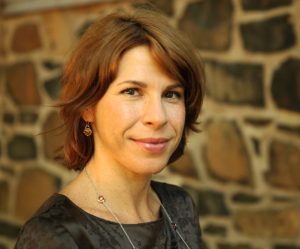
Since joining UConn in 2015, Andreyeva has received 26 grants from government and non-government sources to support her research program, with funders including the World Health Organization, United States Department of Agriculture, Centers for Disease Control and Prevention, Robert Wood Johnson Foundation, American Heart Association, and the Connecticut Department of Public Health.
Andreyeva is a national expert on the Child and Adult Care Food Program (CACFP), where she has worked closely with CT state government offices to document the impact of strengthening the nutrition standards of CACFP, as well as the barriers to implementing this program. She has further examined CACFP implementation nationwide to make actionable, community-based recommendations to ensure children from low-income households can access better nutrition.
Andreyeva has also built a national reputation internationally as a food and beverage tax policy expert. She, alongside economist Frank Chaloupka (University of Illinois at Chicago), created an online sugary drink tax calculator that allows policymakers and advocates to calculate the predicted revenue from a sugary drink tax based on several parameters. The World Health Organization also invited her in 2018 and 2019 to conduct reviews on the impact of food prices on dietary and health outcomes and the fiscal and pricing policies on foods and non-alcoholic beverages.
At the state and local level, Andreyeva has partnered with the CT Department of Public Health to create 11 evidence-based training modules for future childcare providers and to research the effects of the COVID-19 pandemic on obesity-related factors in young children through close collaboration with the CT WIC office, Hartford-based physicians, CT employers, and mothers who gave birth between 2020 and 2024.
Andreyeva also actively promotes community-engaged work in her field through her co-creation and direction of the Tufts University/University of Connecticut Research Innovation and Development Grants in Economics (RIDGE) program. Funded by the USDA Economic Research Service, RIDGE supports scholars conducting economic research on food assistance programs to guide subsequent policy changes.
Angela Bermúdez-Millán
Distinguished Faculty Community Impact Award
An associate professor-in-residence in Public Health Sciences, Bermúdez-Millán has dedicated her career to direct and intentional engagement with communities vulnerable to food insecurity and related health issues – a path which she has paved through her scholarship and teaching.
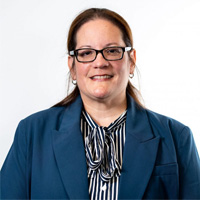
Central to Bermúdez-Millán’s research is a focus on the social determinants of health in minority populations and their effects is a community-based participatory framework. One of her works examines the impact of food insecurity on dietary quality, emotional eating, binge eating, mental distress, and diabetes markers to inform the development of a decisive, culturally appropriate community-based intervention for food-insecure Latinas at risk for type 2 diabetes mellitus.
Bermúdez-Millán and her collaborators also gathered quantitative and qualitative data to inform the design of a community-based intervention promoting appropriate and healthy weight through increased fruit and vegetable consumption among overweight/obese, low-income children participating in the Women, Infants, and Children (WIC) program.
As a co-investigator in the Diabetes Risk Reduction Through Eat, Walk, Sleep and Medication Theory Management (DREAM) study, Bermúdez-Millán developed a community health worker nutrition intervention targeting depressed Cambodians. These are just a few examples of the embeddedness of local communities within her work.
Aside from the many forms of community-based participation in her research, Bermúdez-Millán intentionally engages community experts and stakeholders in her teaching, lecturing alongside organizations like the Hartford Food System, the Hispanic Health Council, Foodshare Institute, and End Hunger Connecticut. She also developed the Introduction to Interprofessional Public Health Practice, a community-engaged graduate-level course required for all master’s in public health (MPH) students.
Bermúdez-Millán also revised and taught the Food, Health, and Politics graduate seminar, which attracts UConn MPH, dual degree, public policy, social work, and allied health students and students from Trinity College. She developed the Public Health Nutrition graduate seminar, which introduces community and global principles and practices of public health nutrition. She co-precepts the MPH Practicum, a course designed to allow students to integrate public health theory and practice into practical, real-life experiences that serve the greater community through placement in specific community-based organizations such as the Hispanic Health Council Family Nutrition Program and the Bristol Health Department.
Roman Shrestha
Emerging Faculty Research Scholar Award
Roman Shrestha, an assistant professor in Allied Health Sciences, is known for his innovative methods in overcoming barriers to healthcare access, engaging critical stakeholders who can effect change, and building community capacity to sustain positive changes. Shrestha’s research centers on health disparities in sexual and gender minority (SGM) communities, with a specific focus on HIV, substance use, and mental health. With a solid foundation in public health and community-engaged research, he develops and implements evidence-based interventions and leverages digital health technology to bridge gaps in healthcare accessibility and outcomes. He has long been committed to understanding and mitigating health disparities among marginalized populations, leading him to the forefront of research in SGM communities, particularly in low- and middle-income countries (LMICs) like Malaysia and Nepal.
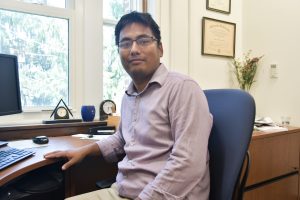
Over the years, Shrestha has led and collaborated on several federally funded research projects globally. His community-engaged approach involves working directly with diverse community stakeholders – including researchers, community members, healthcare systems, community-based organizations, and governmental agencies – to ensure a holistic and inclusive perspective in addressing health disparities among SGM communities.
Shrestha is also involved with the Community Advisory Board (CAB), which comprises representatives from rural and urban settings, including researchers, members of the LGBTI+ community, clinicians, and community leaders. Additionally, he actively engages with other stakeholders such as the Ministry of Health, the Malaysian AIDS Council, clinical partners, and various NGOs, working directly with key populations and international donors to facilitate research impact in the community.
Shrestha utilizes innovative methodologies in his research, including leveraging cutting-edge digital health technologies to scale up HIV prevention and treatment and other support services (e.g., mental health, addiction) in marginalized populations. He recently completed two projects in Malaysia: one which implemented Malaysia’s first web-based HIV self-testing platform, which was conducted in collaboration with the Malaysian Ministry of Health, and another that developed and evaluated the first ‘clinic-affiliated’ smartphone app that offers a discreet means for members of SGM populations to access HIV prevention, mental health, and gender-affirming support services in the face of multifaceted barriers in Malaysia.
Shrestha’s willingness to mentor other budding scientists and build the capacity of the community members further demonstrates his excellence in community-engaged scholarship. He serves on the ‘Multidisciplinary Advisory Committee’ on several NIH-funded training institutes and, as part of his expanding digital health research portfolio in Malaysia, his team has established the multidisciplinary mHealth Capacity Building (MCB) committee to enhance the capabilities of researchers, clinicians, and members of non-governmental organizations (NGOs).
Richard Pomp
Distinguished Faculty Research Scholar Award
The Alva P. Loiselle Professor of Law and Board of Trustees Distinguished Professor Richard Pomp’s services represent a sustained record of a profound impact on the daily lives of citizens and the structure of government and have made him indispensable to many legislatures throughout our country and the world.
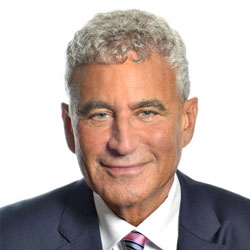
Pomp is among the most sought-after UConn professors as a visiting scholar, consultant, and expert witness. He has provided services to the governors and legislatures of nearly half the states and has served as an expert witness on tax disputes in over 100 instances. His testimony is often cited by judges in their opinions.
He has authored or co-authored numerous briefs to the United States Supreme Court, with his argument prevailing in most cases. Among them was the landmark decision in Wayfair v. South Dakota, which established the right of states to tax their residents’ online purchases from out-of-state vendors, reaching up to $13 billion in otherwise missing tax receipts and contributing to the public coffers of the states.
Pomp has also been a leading force in global taxation. In 1979, he was part of the first group of four tax academics invited to the People’s Republic of China since the Cultural Revolution. Professor Pomp was key in establishing the Law School’s exchange program with a Chinese institution, and many Chinese students came to the Law School to study with him.
Pomp further designed an independent tax court for New York and reformed that state’s personal and corporate income tax. He also helped draft the Zambian value-added tax, the Navajo tax code, the Connecticut income tax, the Alaskan personal income tax (currently pending adoption), the federal Internet Tax Freedom Act, and parts of the Uniform Division of Income for Tax Purposes Act (as proposed by the Multistate Tax Commission).
Pomp has served as an advisor to cities, states, the Multistate Tax Commission, the Navajo Nation, the U.S. Congress, the U.S. Treasury, the Department of Justice, the IRS, the UN, the IMF, the World Bank, and numerous foreign countries, including Indonesia, Gambia, Zambia, Mexico, the Philippines, Pakistan, India, and Vietnam. His services bring skill, energy, and focus to this field in a way that has improved government operation and the fairness of our tax regimes in scores of jurisdictions in the U.S. and worldwide.
Student Category
Erin Cova
Graduate Student Award
A graduate student in the School of Medicine, Erin Cova has dedicated her time, energy, and research to advancing health equity. She is the co-founder of the UConn Health Leaders (UCHL), a program whose mission is to train the next generation of healthcare providers who will address the social determinants of health for patients throughout Connecticut. Cova has collaborated closely with local primary care clinics to assist them in identifying and addressing the unmet social needs of their patient populations, including performing community assessments to determine available resources and establishing a partnership with local community organizations to create a patient resource referral system.
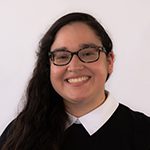
Cova was instrumental in establishing the UCHL program’s inaugural clinical site, which has grown to encompass multiple sites across the state, three of which she oversees. As site coordinator, she has served over 3,000 hours, acting as a point of contact for clinic staff, performing site evaluations and training, advising over 200 volunteers, and briefing medical providers regarding the results of their patients’ screenings to enhance holistic patient care.
Cova further developed an intervention screening tool that volunteers continue to use across clinical sites, enabling them to screen patients for social risk factors and provide them with resources during the same encounter. After four years, the UCHL program has trained over 350 UConn volunteers, screened over 12,000 people, and addressed over 2,500 social needs. Cova has disseminated findings from the UCHL program at multiple local, regional, and national meetings and through a peer-reviewed publication in the Journal of General Internal Medicine (JGIM) to inform future practice further.
Aside from her dedicated leadership in the UCHL program, Cova shows a passion for preparing pre-health undergraduate students for their future careers, mentoring individual students both one-on-one and through an annual lecture series focused on guiding them through the graduate school application process, helping them to find summer internships, and advising them on their overall career goals. She has further organized panels of health professionals and graduate students to provide UCHL volunteers with specific information and networking opportunities regarding careers in health care. Through her mentorship, other students have been inspired to create health-equity-based programs addressing lung and breast cancer screening disparities.
Sun Letian
Undergraduate Student Award
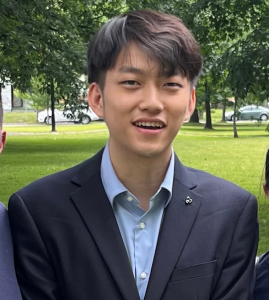
A second-year political science student, Sun Letian founded the Housing Community Project for the Storrs community, acting as a policy analyst to gather reflections from the community that will inform a policy paper on future housing developments in the area. Additionally, Letian has directly applied his major within state government, including his most recent position within the Office of Connecticut Governor Ned Lamont. In this role, he assists constituents in resolving their voiced issues, often collaborating with other departments, participating in assembly conferences, and drafting valuable policy memos and proclamations that have improved government accessibility and responsiveness.
Aside from his professional and research activities, Letian has formed running groups that connect local and international UConn students and perform charity shows with UConn’s Piano Club.
Staff Category
Megan Delaney
Staff Award
Joining UConn’s School of Pharmacy in 2020, Megan Delaney has dedicated herself to the University community, specifically UConn students. Since then, she has served as the sole academic advisor for over 120 students in the pre-professional program and numerous prospective students to support them through their educational trajectories and future careers.
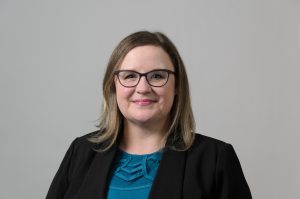
In addition to formal academic advising, she operates the Pharmacy Learning Community, organizing events and teaching over 40 learning community seminars. She further plays a crucial role in three School of Pharmacy committees and advocates for students and staff as a School of Pharmacy Representative in the Regional Campus Forum and Undergraduate Advising Council.
Outside of academic advising, Delaney is the advisor of the Wellness Committee’s Holistic Wellness Subcommittee. In this role, she led the initiative to establish the ‘Wellness Locker,’ a locker containing personal hygiene and menstrual products for School of Pharmacy community members in need. She also started a pharmacy peer advising program in 2023 that connects pre-professional students with professional student mentors, allowing student pharmacists to build transferable skills for their future clinical practice. Due to the program’s success, it has been used as the basis for an upcoming Academia Track for professional students interested in becoming pharmacy educators.
Delaney’s dedication to student success can be traced to her previous role as an academic advisor in the College of Liberal Arts and Sciences (CLAS), where she supported students who were academically at risk and co-founded the college’s Staff Diversity, Equity, and Inclusion Cohort. Additionally, in her Ed.D. capstone project, Systematic Whiteness, Racial Consciousness, and Deconstructing Becky(s): A Phenomenological Study of White Women STEM Academic Advisors, she analyzed how the advising practices utilized at historically white institutions (by academic advisors who tend to be white women) can negatively impact the experience of BIPOC students. She made further recommendations that have the potential to have a significant impact on the UConn community, including professional development focused on anti-racism for white advisors, the review of university hiring practices, and having UConn as an institution take a firmer stance on the importance of diversity, equity, inclusion, and access.
Community Partner Category
Auerfarm
Community Partner Award
A 120-acre, non-profit, educational farm situated in Bloomfield, Connecticut, Auerfarm has functioned as a vital partner for UConn Extension and an indispensable resource for linking the university to the diverse population it serves. UConn staff, students, and participants in various Extension programs benefit from using the Auerfarm facilities for hands-on field experiences and collaborations.

Annually, over 12,000 youth participate in 4-H educational programming at the farm. These programs include seven weeks of summer 4-H Camping, 4-H STEM school programs, 4-H Clubs, 4-H particular interest field trips, and 4-H after-school enrichment. Auerfarm further provides facility space for grant-based activities that were developed in partnership with UConn and include the National 4-H Council Pollinator Pathway Grant; USDA grants, including the UConn Children, Youth, and Families at Risk (CYFAR) Healthy Homes Project; and the Food, Agriculture, and Career Biotechnology 4-H Program.
Auerfarm is home to the UConn Master Gardeners Garden, a 1⁄4-acre garden annually serving as a teaching space for over 200 gardeners. This civic-oriented program addresses critical societal issues around food deserts and underserved populations while contributing to the public good. Annually, the garden harvests nearly two tons of food for Connecticut Foodshare.
Auerfarm has partnered with UConn faculty in scholarly presentations for the National Association of 4-H Youth Development Professionals, the National Ag in the Classroom Conference, and the National Association for the Education of Young Children. This willingness to collaborate on scholarship-applied research grants and other creative activities dramatically enhances the UConn 4-H program.
Herb Virgo, Keney Park Sustainability Project
Community Partner Award
Founded and directed by Herb Virgo, the Keney Park Sustainability Project (KPSP) has been an essential community partner for many units and faculty at UConn and with external organizations within the Hartford area. It has served Hartford communities with comprehensive health, nutrition, and environmental education programming for over 15 years.
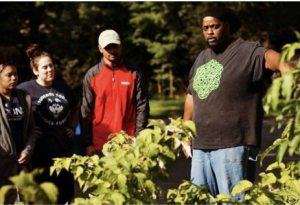
KPSP was established to provide hands-on training, on-site demonstrations, outreach, and community collaborations that help Hartford families become more self-sustainable and environmentally conscious while preserving historic Keney Park. KPSP’s experiential opportunities for community members include urban agriculture, beekeeping, mushroom production, aquaponics, animal husbandry, forest management, composting, maple syrup production, stormwater collection, and woodworking.
Virgo has worked tirelessly to bring together community stakeholders – from city government, universities, businesses, organizations, and community members – to facilitate environmental stewardship efforts throughout Keney Park and provide enriching programs that offer a multitude of benefits to community members (including nutrition education, building social capital among community members, and developing environmental literacy).
Virgo coordinates part-time staff and over 2,000 volunteers to facilitate KPSP’s operations and programs throughout the 693-acre public park. He has guided the development and sustainability of community-based food systems, including farmers’ markets, greenhouses, community gardens, school-based gardening, home gardens, a composting site, an aquaponics farm, and a backyard-raised garden program. Many of these projects have been co-created and co-developed with Hartford residents, including youth served by the community garden sites, Youth Service Corps volunteers (through KPSP’s youth job-training program), and additional lifelong learners and community volunteers.
In addition, Virgo and KPSP have helped to redevelop a significant portion of the trails within Keney Park, including three years of managing a state-funded trails project. Virgo has also managed the installation of 15 miles of trails in Keney Park, a project that required the collaboration of multiple organizations, local and state entities, volunteers, and contractors.
KPSP has partnered with UConn departments and programs since 2018. Hundreds of students, faculty, and staff from 13 UConn colleges and schools have volunteered thousands of hours with KPSP. A few of the successful programs that have resulted include partnerships with food and agriculture extension faculty to support urban farmers, working with faculty in pharmacy to assist with wellness pop-up events for Hartford residents, and partnering with faculty in natural resources on urban forestry efforts. He has been a vital community partner in tying resources at UConn into the critical community-based work of KPSP, which has enormously impacted Hartford communities.
Mashantucket Pequot Tribal Nation (MPTN)
Community Partner Award
The Mashantucket Pequot Tribal Nation (MPTN) began a close partnership with UConn through the Federally Recognized Tribes Extension Program (FRTEP), a USDA-NIFA funded project initiated in 2017 as a response to the need to enhance food security and sovereignty within the MPTN while also reducing rates of childhood and adolescent obesity and Type II diabetes within the tribe. The program was designed with specific objectives to increase the capacity of the agricultural enterprise on Tribal land, to provide workforce development training for Tribal members, and to deliver health and nutrition education to reduce obesity and diabetes in young people.

Tribal needs for Extension programming in agriculture, workforce development, youth development, nutrition, health, Pequot language, and cultural preservation were identified and prioritized through multiple meetings, interviews, and a focus group discussion. Tribal leaders, members, and the UConn FRTEP team (including crop specialists, 4-H, nutrition Extension educators, and business planning and evaluation specialists) participated.
The FRTEP project has achieved several measurable outcomes since 2017. The project goal to improve food security in the MPTN was accomplished by establishing a meechooôk farm and cultivating more land. Since 2022, the meechooôk farm-grown produce and meat have been distributed to 180 Tribal community members (15 percent of the MPTN population) every other week in food boxes. Additionally, 30 diabetic patients have been prescribed fresh produce from the farm since 2022, supported by the Food Rx Program. Over 8,000 lbs. of produce were harvested in 2023, and farm products are being sold at the Foxwoods Resort and Casino and local supermarkets. Additionally, the project has encouraged more households to start their backyard gardens.
The FRTEP project has significantly strengthened the relationship between UConn Extension and MPTN. The FRTEP grant has built on the relationships and infrastructures that have enabled MPTN to secure additional funding from other agencies, including USDA’s Natural Resource Conservation Service and the Native American Agricultural Fund. The project’s success has led to the creation of the MPTN Department of Agriculture in 2021, which continues the education, nutrition, and farming work previously done in collaboration with UConn Extension.
Donald Swinton
Community Partner Award
As Senior Director of Development for the School of Engineering at the UConn Foundation, Donald Swinton has built a successful development operation. Over 15 years, he has raised over $95 million in funding and sponsorship for many institutes and research centers that drive economic development, foster groundbreaking academic research, and prepare highly trained students.
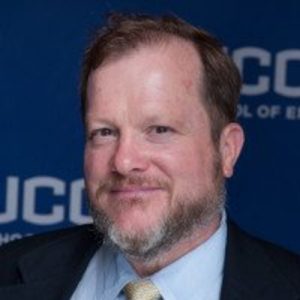
Swinton has leveraged business-facing relationships that have had a direct and far-reaching impact on the ability of the School of Engineering to produce students capable of meeting the ever-evolving needs of industry and innovating next-generation solutions. His ongoing contributions have enriched scholarship, research, and creative activity and enhanced curriculum, teaching, and learning in transformative ways. Swinton has also helped advance diversity, equity, and inclusion, as well as human rights and sustainability in the engineering field through the development of crucial university institutes, including:
The Vergnano Institute, Altschuler Cybersecurity Laboratory, Eversource Energy Center for Excellence, UConn-FEI Center for Excellence in Microscopy & Materials Characterization, Pratt & Whitney Scholars Program, Cigna Computer Science Scholars Program, Krenicki Institute for Arts & Engineering, United Technology Institute for Advanced Systems Engineering, Engineering for Human Rights Institute, Avangrid Clean Earth Partnership, Nursing and Engineering Innovation Center, and the Belimo Scholars Program.
Building on a three-decade effort by the School of Engineering to diversify student recruitment by collaborating with Mark and Betsy Vergnano and other prominent alums, he transformed the College’s Bridge to Engineering program – scaffolded recruitment, mentorship, and professional development initiative for under-represented students – into the nationally recognized Vergnano Institute that has positioned UConn as a leader in transforming the face of the engineering field.
Another example is the Eversource Energy Center, which is both a catalyst for groundbreaking research on storm preparedness and a new study on the transition from conventional energy to a green energy economy using wind, solar, hydrogen, and other new forms of power. Swinton wrote the 2011 proposal that created the center and, in the years since, has generated $30 million in support. Faculty and students involved in the center work with ENG and CAHNR, CLAS, and Social Work colleagues on various issues related to equitable access to energy and public opinion on energy transitions.
Throughout his tenure, Swinton has also had a hand in organizing numerous outreach events promoting School of Engineering industry partnerships, such as the Sikorsky Helicopter UConn Fly-in, Pratt & Whitney Nights, and the IPB monthly Connecticut Manufacturers’ Meet-Up. In October 2022, he organized a conference that brought elected, industry, research, and advocacy leaders together to showcase new UConn research and its potential implications.
Institutional Transformation Category
UConn Writing Center
Institutional Transformation Award
Formed through the UConn Writing Center in 2009, the Secondary School Outreach Program supports learners and educators through mutually beneficial programming and developing strong learning communities centered around literacy. The Outreach Program engages the vast network of teachers affiliated with the Connecticut Writing Project to source teacher recruits as tutors for high school writing centers and to encourage middle and high schools to create their own. Beginning with just one tutor, one high school teacher, and one school, the program has grown to fit an increasing demand, with approximately 70 writing centers currently operating.

Through the Secondary School Outreach Program, the UConn Writing Center has created an initiative throughout northeast Connecticut that includes three signature activities: an intensive collaboration with one new secondary school each year, an annual conference on and for secondary school writing centers, and ongoing programmatic support for writing center teachers.
The Outreach Program also regularly provides opportunities for faculty and students in secondary schools across the state to visit the UConn Writing Center and partake in tutor-led learning activities to strengthen their tutoring skills and approaches and learn how to create their own programs.
The Writing Center’s Secondary School Outreach Conference attracts hundreds of secondary school administrators, faculty, and students with the opportunity to enhance their understanding and practices surrounding secondary school peer tutoring. Importantly, students also present their work and lead workshops at the conference, which allows them to showcase their knowledge and skills and to serve as a resource for others. With learner-created and centered presentations and activities, the conference provides myriad opportunities for collaboration and growth.
The impact of the Outreach Program is tremendous. With an estimated ten student tutors per school across 70 schools over 17 years, the program has reached almost 12,000 students who are now trained as tutors and support countless other students in peer writing centers across the state. High school students formerly trained by undergraduate tutors are now coming to UConn and seeking employment as writing tutors. The UConn Writing Center has also worked closely with the Neag School of Education and the Early College Experience (ECE) program to recruit pre-service English teachers to become involved in writing center outreach as relevant pre-career experience.
Nadine Brennan, David Embrick, and Kim Schwartz, the Research on Resilient Cities, Racism, & Equity Initiative (RRCRE)
Institutional Transformation Award
Nadine Brennan is the Associate Campus Director at UConn Hartford. Chief among her responsibilities is establishing and maintaining partnerships with community organizations in the greater Hartford area.
David Embrick is an Associate Professor in the Department of Sociology and Africana Studies with an appointment as Director of UConn Hartford’s Research on Resilient Cities, Racism, & Equity Initiative (RRCRE).
Kim Schwarz is the Director of Event Services at UConn Hartford. Since the opening of the campus, she has forged partnerships with Hartford-based event venues and restaurants to support programming for students and our extended communities.
In a short period, Ms. Brennan, Embrick, and Ms. Schwarz and their colleagues have formed a collaboration that has helped advance the newly established UConn Hartford campus as a central hub for community engagement in the city, developing innovative programs that deliver place-based, authentic, and high-impact learning opportunities that resonate with students and Hartford community members.
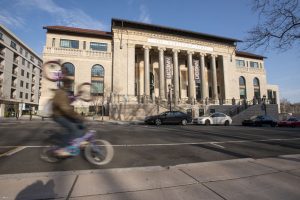
Building on scholarship in Psychological Science, Human Development and Family Sciences, Social Work, Public Policy, Business, Law, Urban and Community Studies, and other Hartford-based units, this team leverages the campus’s proximity to state and local government, corporate entities, other regional academic institutions, and non-profit and arts organizations to support students, enhance research productivity, and serve the wider community.
The first of its kind at a regional campus in the university system, Research on Resilient Cities, Racism, & Equity Initiative (RRCRE) has been a catalyst for this community-engaged work. RRCRE serves as a collaborative research hub that integrates and enhances the global urban studies scholarship and community practice of UConn Hartford’s faculty by connecting their projects to community-relevant initiatives.
With the collaboration of Brennan, Schwarz, and others, Embrick has manifested this work by building essential relationships with local organizations and submitting grant proposals for new research projects. The team has built partnerships with organizations such as The Hartford Foundation for Public Giving, MetroHartford Alliance, Hartford Urban League, iQuilt, Keney Park Sustainability Project, Connecticut Health Foundation, Charter Oak Cultural Center, HartBeat Ensemble, Trinity College, and the University of Hartford.
Brennan, Embrick, and Schwarz have drawn on these partnerships to apply for and receive numerous grants. The “Hartford Love Your Block—Oral Histories and Evaluation Project,” supported by a $60,000 grant from the Hartford Foundation for Public Giving, brings researchers, students, community members, local philanthropic foundations, and government officials together to examine and find solutions to challenges in some of Hartford’s most historically underserved and marginalized neighborhoods. Utilizing data analytics and GIS survey tools, the Hartford Project supports the evaluation and sustainability of local community beautification efforts while building democratic participation in city and state governments.
RRCRE also received a $2.9 million U.S. Department of Commerce: Connecting Minority Communities Pilot Program grant to build research infrastructure, create jobs, and provide learning pathways and opportunities for Hartford’s youth. The most significant single regional campus grant ever awarded, the Connecting Minority Communities Program, also supports UConn students as part of our federally designated Minority Serving Institution status.



